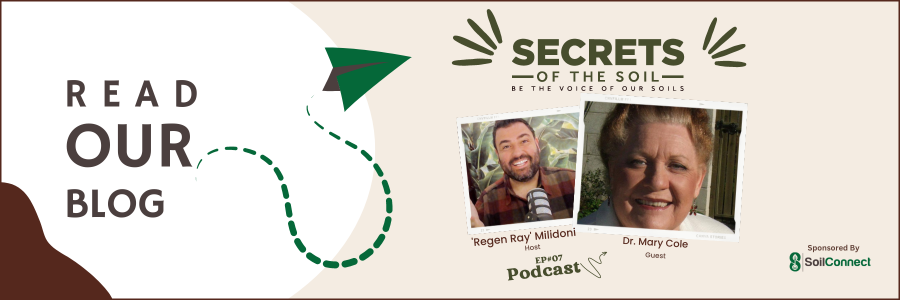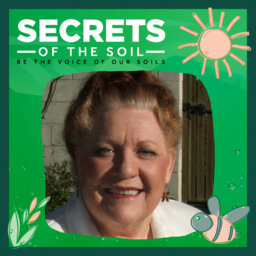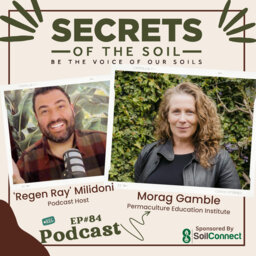I recently had the pleasure of podcasting with Dr. Mary Cole, an esteemed soil microbiologist, on our latest episode of Secrets of the Soil. It was a riveting conversation that delved into the fascinating world of soil microbiology, weed management, post-fire soil reclamation, and the nutritional value of natural foods. Here are three key takeaways from our discussion:
1️⃣ Soil Health: The Foundation for Sustainable Agriculture
Healthy soil is the backbone of sustainable agriculture. Dr. Cole emphasized the crucial role of soil in human and plant health, nutrition, and profitability. By nurturing and preserving soil microbiota, we can unlock its incredible potential to enhance crop productivity, mitigate environmental degradation, and improve the nutritional content of our foods. Let’s shift our focus to building soil health for a brighter and more sustainable agricultural future.
2️⃣ Weed Management: A Holistic Approach
Weeds, often seen as a nuisance, can actually be valuable indicators of soil health. Dr. Cole shared insights on managing weedy species through strategies like preventing flowering, mulching, and preserving roots. Compost tea, fish and kelp, and nutrient-rich soil have shown promising results in controlling weed growth without relying on harmful herbicides. Let’s adopt more holistic approaches to weed management that encourage biodiversity and foster soil health.
3️⃣ Education and Innovation: Catalysts for Change
Traditional education is falling behind when it comes to soil health and regenerative agriculture. Dr. Cole stressed the importance of exploring new perspectives and challenging conventional notions. She shared her own journey in soil management, from starting AgPath to educate farmers about organic and biological practices to creating a digital marketing agency, Soul Connect, to promote soil caring businesses. Let’s embrace continuous learning, leverage technology, and inspire change in the agricultural industry.
Soil is a powerful ally that holds the key to a sustainable and resilient future. Let’s come together to unlock its secrets and build a healthier, more regenerative world. Feel free to reach out or share your own thoughts and experiences in the comments below!
#SoilHealth #RegenerativeAgriculture #SustainableFarming #Education #Innovation #FutureofAgriculture
Who Is Dr. Mary Cole?
Mary is a Worldwide Branding Professional of the Year – 2015-2016
representing Farming and Agriculture – in recognition for her exemplary leadership qualities & unwavering dedication to her profession.
Dr. Mary Cole is a well-known academic, plant pathologist, and soil microbiologist who provides instruction and workshops/courses in biological non-chemical/sustainable agricultural farming practices to farmers, students, and consultants around the world. As an Honorary Fellow at the University of Melbourne she supervises PhD students and her lab, Agpath P/L, provides summer vacation experience in soil microbiology and composting for graduates of Victorian and interstate universities.
Career:
- PhD in plant pathology from Monash University carried out at Monash University, South Australian Dept of Primary Industries & UCLA, Davis, California.
- Lectures in plant pathology, in particular, grape vine diseases, but agricultural and environmental pathology in general; microbiology of soil and biological/organic and biodynamic principles including the soil food web.
- 1994 to present Academic at Charles Sturt University, Monash University, and University of Melbourne.
- 1999 appointed foundation director for Centre of Wine, Food & Agribusiness in Faculty of Business and Economics at Monash University.
- 2006 appointed to Faculty of Land & Food Resources at the University of Melbourne – involved in postgraduate distance mode to national and international students.
- 2009 continuing part-time lecturing in Diplomas of Viticulture and Oenology for Goulburn Ovens Institute of TAFE.
- 2009 continuing part-time lecturing in Faculty of Medicine, Monash University.
- 2010 continuing coordinating and lecturing in a professional development subject with Dr. Elaine Ingham of Soil Foodweb Institute USA.
Research:
- Recognised as a national and international leader in research into the plant pathogen, Botrytis cinerea, the fungus that causes rot of grapes, flowers, and many vegetables.
- Contributes papers to national and international journals.
- Has chaired and participated in national and international conferences and symposia in plant pathology.
- International referee for Journal of Agricultural & Food Chemistry. ACS Publications.
Consulting:
- Has a research-consulting laboratory with 2 staff.
- Can carry out water testing, any plant disease identification and identification of fungi; quality assurance, label rate validation; research projects in agriculture, horticulture, and biological post-harvest crop protection, soil biology health.
- Expert witness statements for courts and VCAT.
- Integrated Pest and Disease Management workshops for wine industry.
Public interest:
- 20 years an Honourary Consultant to the Victorian Poisons Information Centre on mushroom poisoning and identification.
- Involvement in Landcare and alternative farming practices.
- Public speaking to professional, farming, and community groups
Member of the Australian Institute of Agriculture Science & Technology
Website: www.agpath.com.au

The Symbiosis of Soil and Plant Health
Discover the intricate connections between soil microbiology, innovative weed management, post-fire soil reclamation, and the nutritional value of foods. Our latest “Secrets of the Soil” episode with Dr. Mary Cole dives deep into the earth to unearth the secrets of a healthier, more sustainable agroecosystem.
Rooted Wisdom: Embracing Weeds as Allies
Turning Weeds into Mulch
On a recent foray into South Australia, Dr. Cole recalls marveling at a vineyard where what might be seen as an unruly invasion of weeds was instead leveraged as potential mulch. This vineyard owner’s innovative perspective saw each weed as an asset rather than a nuisance.
Reclaiming Soil Post-Fire with Weedy Species
Wildfires decimate landscapes but also cue the arrival of weedy species, which pave the way for restoration. Contrary to conventional methods that employ herbicides, these weedy species can be mulched, maintaining their root systems, to organically rejuvenate the soil and aid in the recovery of lush grasses.
Growing Digital Roots with Soul Connect
As the regenerative movement flowers, Dr. Cole has germinated Soul Connect, a digital marketing agency dedicated to soil caring businesses. Leveraging expertise from “Secrets of the Soil,” the agency offers specialized marketing strategies for businesses aimed at fostering soil health and sustainability.
From DiPel to Regenerative Revelation
Reflections on the industry’s growth highlight that, unlike yesteryears dominated by chemical solutions like DIPEL, today’s landscape is more attuned to organic methods. Dr. Cole reminisces about the mentors who seeded her mission to minimize agricultural chemicals, a sentiment echoed by present-day farmers concerned about their progeny’s health.
Cultivating a New Generation of Soil Stewards
As the agricultural baton is passed to the younger generation, there’s increasing cognizance of soil vitality, something Dr. Cole feels is inadequately addressed in formal educational institutions. Through AgPath’s workshop and hands-on experience, individuals gain a microscopic understanding of soil’s living components, often lacking in university curricula.
From Manure to Regenerative Agriculture
Digging into past experiences, Dr. Cole shares her Italian veggie patch upbringing, where manure was the sole fertilizer, underscoring a lifelong commitment to natural growth methods. This respect for land was deepened by her First Nation friends and propelled her career in chemical-free soil management.
Advocating for Authentic Agriculture and Nutritional Integrity
A discussion on the broad scope of soil and plant health gravitates toward the concept of regenerative agriculture. With the term lacking a universal definition, Dr. Cole challenges listeners to derive their own understanding based on tangible benefits visible in the regenerative practices they observe.
Compost Tea Triumph
Highlighting the transformative power of compost tea combined with fish and kelp, Dr. Cole recounts the success story of a vineyard that transitioned fully to organic practices. The miraculous restoration of soil structure and microbial vitality narrates an anecdote of regeneration.
Edible and Beneficial
The tide is turning in traditional farm approaches to weeds, with many “nuisances” now recognized as edible species. Dr. Cole espouses a change in mindset, encouraging farmers to see potential in the diversity of plant life present on their land.
The conversation with Dr. Cole illuminates the profound interrelationship between soil health, plant vitality, and human well-being. With the growing acknowledgment of organic and regenerative practices, the episode leaves listeners with a verdant vision for agriculture’s future, where each element of the ecosystem thrives synergistically. Tune in to “Secrets of the Soil” to learn more about Dr. Cole’s journey and her wisdom on nurturing the land that sustains us.






